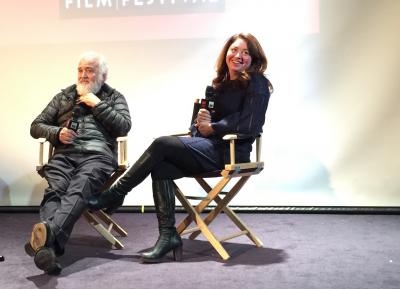First Amendment Among Equals at Doc Fest

Aside from the lack of more recent stories and cases, Liz Garbus’s “Shouting Fire: Stories From the Edge of Free Speech,” released in 2009, feels like it could have been made last year. The film documents cases that arose in the aftermath of Sept. 11, 2001, during a time when President George W. Bush’s press secretary instructed people to watch what they say.
In the mid 2000s, Ms. Garbus began examining how Iraq War protests were being handled. Her impetus was a conversation with Sheila Nevins, the long-time head of documentaries at HBO. The original story she pursued, about students staging a play and being shut down by their school, hit an impediment. “I started to think about different ways to tell the story and look at it,” she said on Saturday in a talk following a screening of the film at the Hamptons Take 2 Film Festival in Sag Harbor.
She began thinking about how a film could examine issues of free speech in terms of her father, Martin Garbus, and his distinguished decades-long career as a staunch defender of that right. The film became “more of an essay film, not what I set out to make, but a personal story in some sense.”
The film meanders between stories of those who suffered for speaking freely during that time and the life and the law career of Mr. Garbus, whose clients have included Lenny Bruce, Peter Matthiessen, Robert Maplethorpe, Spike Lee, Robert Redford, Samuel Beckett, and many more. He has represented Nazis who wanted to march in Skokie, Ill., as well as Chinese dissidents and Sikh nationalists. He was an unindicted co-conspirator in the prosecution of Daniel Ellsberg for releasing the Pentagon Papers, and hid a copy of them in his upstate New York house at the time they were being disseminated to media outlets.
Decisions on his cases in areas such as obscenity and libel became established law, effectively eliminating the prosecution of both in this country. He also served as chairman of the Committee to Abolish the Death Penalty. In short, he made for a fascinating and insightful focus of the film.
Ms. Garbus examined cases that included Ward Churchill’s dismissal from the University of Colorado for academic misconduct, following delayed public outrage at an article he wrote immediately after the Sept. 11 attacks. Debbie Almontaser attracted controversy as a New York City school principal and Yemeni immigrant tapped to head the city’s first Arabic language school, which opponents cast as a madrassa. An interview in the New York Post that she said had twisted her comments was her undoing. Chase Harper put masking tape on his T-shirt with a biblical message condemning homosexuality and wore it to a California school. He was told to take the shirt off or to leave. In a more generalized sense, the film also examined how protesters were dealt with during the 2004 Republican National Convention.
Ms. Garbus, a documentary filmmaker who produces films with Rory Kennedy, has directed more than 20 films, many with awards and distinctions. “Lizzie’s subjects go across the whole area of what’s wrong with society, what can’t be fixed and what can,” said Mr. Garbus about his daughter’s films. He said that all of them exude the sense that they were completed yesterday.
“These battles [over free speech] have been going on for some time,” Ms. Garbus said after the screening. “In the film we showed that Thomas Jefferson and John Adams had a debate about it.”
Those in the audience wanted to know how the Trump administration’s policies had affected these issues. Fake news and social media were brought up as concerns. But Mr. Garbus seemed most concerned about court appointments. Not just the Supreme Court, but the federal circuit courts, and the state courts. He mentioned the case of the baker who refused to make a cake for a gay couple, claiming it violated his freedom of expression of religion. The case is to be argued at the Supreme Court this week. “If everyone adopted that position, it would be the end of the anti-discrimination laws,” Mr. Garbus said. “A hotel owner could say I have a right to say I’m not in favor of integration, so I have a right to keep certain people out of my hotel.”
With more potential Supreme Court nominees like the recent appointee Neil Gorsuch, who, like Clarence Thomas and Antonin Scalia, has advocated faithful adherence to the framers’ original intent, Mr. Garbus said, “More and more the questions will go back to what did the Constitution say as it was written, even though it was impossible to see or imagine the decisions of 1789 and 1811 being the standard for how people are treated today.”
